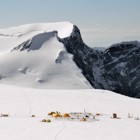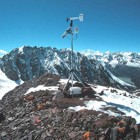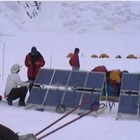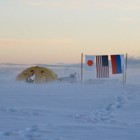Alpine Exploration in Central Asia
glacier-climatic research group at the University of Idaho
Ice-coring Global Climate and Environmental Change Research Educational Program
Scientific scope
The global climate change research program has been developed at the University of Idaho, in collaboration with national and international partners, over the past four years based on new and ongoing research projects supported by DOE, NSF and NASA. This unique program is aimed at filling a substantial knowledge gap in global change processes and their influences on natural and human-influenced systems, e.g., land-atmosphere, surface-ground water interaction, climate-snow-glaciers-permafrost dynamics, water and chemical cycling. Much of the research has occurred at mid- to low-latitudes of the northern hemisphere, a home to the vast majority of the Earth's human population. This research will improve our understanding of global change consequences and their prediction, as well as contribute for an academic program on teaching the course of environmental sciences at universities and schools.
Our particular interest focuses on alpine glaciers of America and Asia where we are conducting the glacio-climatic monitoring and recovering paleo-climatic environmental data from deep surface-to-bottom ice cores drilled at elevations over 4000-5000m a.s.l. Field research in alpine regions, the collecting of synoptic, meteorological, hydrological, glaciological, and remote sensed data allows to study natural processes over the last few decades. The collection of glacier ice-cores enables the analysis of high resolution, multi-proxy, isotope-geochemical time-series, and microorganisms in the glacial ice depositions. From this information, we can study and reconstruct patterns and processes in climate and environment history over the past hundred to thousands of years. These ice-core records from high elevation glaciers provide unique information that can be directly linked to, for example, changes in atmospheric circulation, air temperature, snow accumulation, aerosol and gases atmospheric composition, volcanic eruptions, continental dust source regions, forest fire activity, anthropogenic emissions, marine and continental biogenic activity, microorganism biostratification, solar variability and radionuclide deposition.
Several specific focus areas of our project directly address to the mission of the US Global Change Research Program
- Provide the data that will enable an objective assessment of the potential for, and consequences of, global warming;
- Quantify sources and sink of energy-related greenhouse gases, especially carbon dioxide;
- Determine sources of continental aerosols in atmosphere and how these changes effect radiation balance;
- Identify biological communities and examine microorganism biostratification;
- Improve knowledge of the Earth’s past and present climate and environment, including its natural variability, and improve understanding of the causes of observed variability and change;
- Reduce uncertainty in projections of how the Earth’s climate and related systems may change in future;
- Understand the sensitivity and adaptability of different natural and managed ecosystems and human system to climate and related global change.
Home>Ed Program
- Scientific scope
- Facilities and cooperation
Contact
Vladimir Eisen
Department of Geography
College of Science
P.O. Box 443025
Moscow, Idaho 83844-3025 U.S.A.
Tel: (208) 885-5888
Fax: (208) 885-5724
aizen@uidaho.edu



